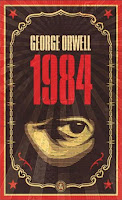Nineteen Eighty-Four, George Orwell
George Orwell's 1984 is a defining example of dystopian fiction in that it envisions a future where society is in decline. It is a cautionary tale of a totalitarian government exercising control over society through the use of language manipulation and threat. Orwell struggled with his health while writing the book, but once it was titled and published, it was an immediate success. It received critical acclaim from numerous literary critics, and Winston Churchill even told his physician that he'd read the novel twice. Despite its success, 1984 has also faced criticism. Throughout its publication history, the novel has been banned and legally challenged numerous times for its subversive or ideologically corrupting content. 1984 influenced public thought on governmental power and control as well as the role of truth in politics.
There are multiple theories on Orwell's selection of the title 1984. The Last Man in Europe was an early title for the novel, but in a letter to his publisher, Fredric Warburg, dated 22 October 1948, Orwell wrote about oscillating between that title and 1984. Warburg suggested choosing the latter, which he believed to be a more commercially viable choice. The introduction to the 2003 Houghton Mifflin Harcourt edition of Animal Farm and 1984 claims that the title 1984 was chosen as a satirical inversion of the year 1948, the year in which the novel was completed. There is no evidence, however, to support this popular theory.
In 1984, Orwell described the horrific nature of an abusive, controlling government. Phrases and terms such as "Big Brother," "thought police," and "doublethink", which were coined in 1984, are still commonly used in popular culture to refer to a government's abuse of power.







Comentaris
Publica un comentari a l'entrada
En este blog están permitidos todos los comentarios, solo le ruego que sea respetuoso/a.
Muchas gracias.